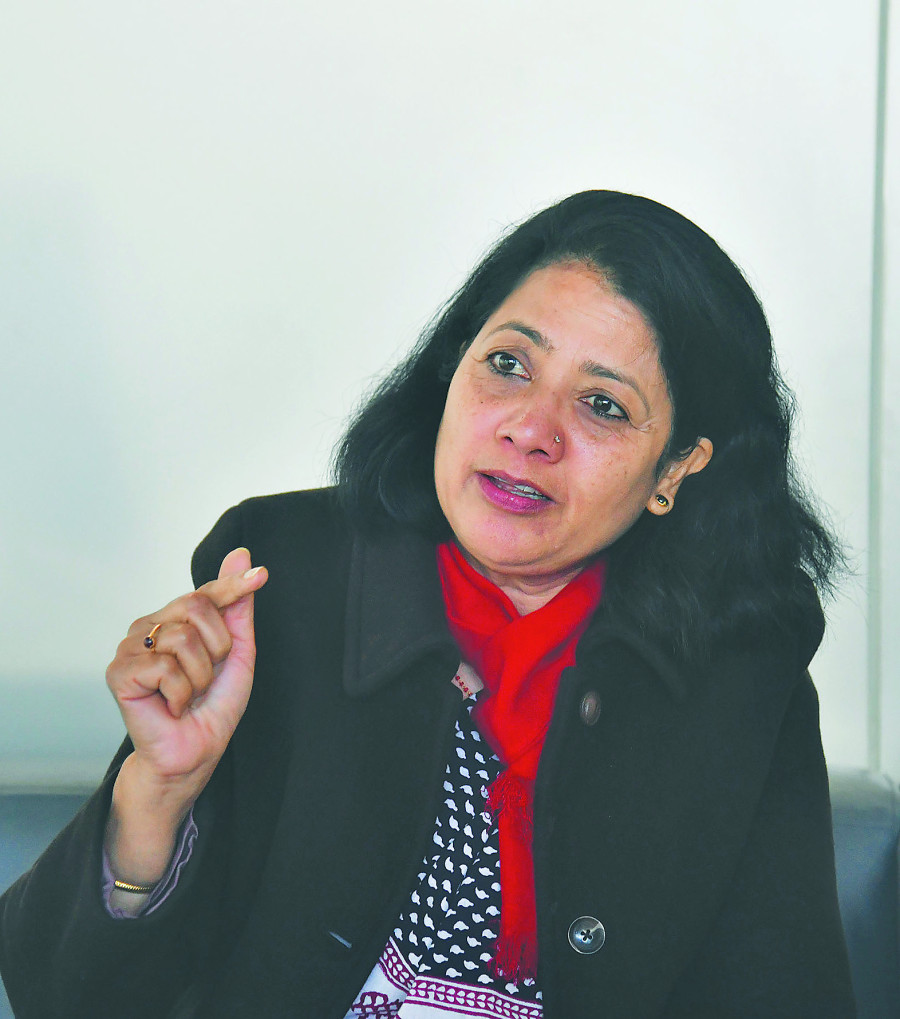Interviews
National Assembly can serve as a coordinating body between federal units
The upper house needs more women who have worked in the field of women’s empowerment.
Thira Lal Bhusal
One-third members of the 59-strong National Assembly are retiring in March after completing their six-year term. One of them is Bimala Rai Paudyal, who was appointed as an area expert by then President Bidya Devi Bhandari on the recommendation of the KP Sharma Oli government. Thira Lal Bhusal of the Post talked to Paudyal, who holds a PhD in development studies, about her experience in the assembly, the body’s functioning and its continued importance.
How productive has the upper house been in the past six years? Many people seem dissatisfied with its functioning and are questioning its relevance.
The assembly has just completed its first six-year term after the adoption of the new constitution. It should be taken as a learning period. So, it’s too early to review the performance of the National Assembly and draw a definite conclusion on its relevance. We should analyse its positives as well as negatives in this period. It is too early to question its relevance as it has some beautiful aspects.
One beautiful thing about the upper house is that it reflects Nepal’s diverse picture. Members are elected from all seven provinces under different clusters such as women, Dalits, marginalised communities, people with disability and under the other category. On top of that, the President appoints three members under the experts category on the recommendation of the government. So, this makes for an excellent composition.
The National Assembly members are elected by the representatives of provinces and local units. So, it can be a proper body to facilitate and coordinate between the federal units. Based on our six-year experience, we are amending regulations to fit the assembly for that role. We are including some provisions in its regulations to hold monthly discussions on issues related to implementation of the federal system, to consult the provincial assemblies while making laws, and to ask the National Assembly chair to hold yearly meetings with speakers of all provincial assemblies. This will help maintain coherence and harmony in the works of the federal and provincial levels, in turn sustaining our federal system.
Lawmakers elected directly from their constituencies have constraints as they are more occupied by local demands such as building roads, bridges, schools, etc. But National Assembly members have a luxury to see things mainly from national perspectives as they aren’t under pressure from the people of their constituencies. Thus the upper house is a body that can think and make decisions by rising above partisan interests and constituency-based limitations.
There is a need for checks and balances in certain works of the House of Representatives. The government is more accountable to the lower house as the latter elects the prime minister. The lower house can make and break governments, the upper house can’t do that. When the lower house may take politically-motivated decisions, the upper house can play a more mature role in national interest.
But political parties seem to be using the assembly to ‘dump’ the politicians beaten in elections. In this light, how can the assembly properly function?
Let me talk about my own experience. My first two years in the assembly were quite encouraging. The then government and the President selected me as an expert based on my experience in the development sector. I was told to work using my expertise. That boosted my confidence. I found some lawmakers from across the political spectrum to be quite competent, qualified and mature. As the constitution made it mandatory to legislate over 100 laws within two years of its promulgation, we had a full plate. We were quite busy. The debate was productive and decent, even as lawmakers in the lower house were engaged in blame games.
Things started to get worse after two years. One-third of the 59-member house completed their two-year term. New members got elected. But the assembly didn’t get ideal members in the second lot. The President appointed an active politician under the expert quota. Thus, politicians started to weaken the assembly. After the dissolution of the House of Representatives in 2021, the assembly effectively went into a hibernation. It could have held regular meetings, discussed issues of public concern and addressed them. At the time, the government unveiled its annual budget via a press conference. In the absence of the lower house, it would have been better had the budget been presented in the assembly. Such activities were disappointing.
What type of candidates are ideal for the assembly?
The women who have sincerely worked for women’s empowerment can play an important role. There is gender violence and disparity within political parties. They can raise a strong voice against gender violence in the House. Someone who is a committed cadre may not go beyond the party’s instructions. We in the assembly held prolonged discussions on a proposal to remove statutory limitations to file a case when a girl is raped. We drafted a resolution motion. Representatives from all political parties were initially positive about it. Later, the lower house forwarded the bill to the assembly. It only increased the statutory limitation from one year to two years instead of removing the provision.
Surprisingly, women lawmakers were mum as the political parties issued a whip on the issue. I was the only one to protest. I used the privilege of an expert lawmaker appointed by the President. I had expected women lawmakers would defy party instruction in such a serious case. Six Dalit youths were killed in Jajarkot in 2020. Dalit lawmakers agitated for some days but they couldn’t take any substantive action against that.
We need experts on subjects like information technology, climate change, disaster management and economy. When our government signs various international treaties and agreements that need to be endorsed by the Federal Parliament, such texts should be carefully studied. But many members don’t even go through them.
Do members appointed by the President like you get freedom to work independently? And do they work as per that spirit?
In my case, I used to remind my fellow members that I was not obliged to follow the whip. I have registered amendments in certain bills in which the CPN-UML had issued a whip to its members asking them to endorse it. But it all depends on how the member made it to the House. If someone has reached there after appeasing party leaders, they can’t go against the interests and instructions of such leaders.
But in certain cases you also defended the CPN-UML, erstwhile prime minister KP Sharma Oli and then President Bidyadevi Bhandari.
At the time, the court was hearing the case of dissolution of the House of Representatives. The President was also attacked from various quarters on the row. The issue was sub judice in the top court. But my concern was particularly about the attack made on the basis of her gender. The President wouldn’t have faced the particular abusive words had the President been a man. And, even those who had become ministers and deputy prime ministers were using such offensive words. Should leaders use gender-insensitive words for such an institution? The statements and videos circulated at the time were disrespectful and insulting to all women. One can question the President based on his/her acts but not based on gender. Thus I defended the institution, not the individual. That was an exception. Otherwise, I mostly worked independently.
Do you blame the politicians or the system for the assembly’s poor repute?
The problem is the intent of politicians. Candidate selection process suggests the same. There are some minor faults in the system. The assembly is taken as a House that exists uninterrupted whereas the term of the lower house ends every five years and prime ministers may even dissolve it earlier. Then, there should have been a provision mandating the assembly to oversee federal parliament affairs in absence of the lower house. For instance, we discussed many bills in the assembly and forwarded them to the lower house. Similarly, some bills were long under discussion in the lower house. All of them lapsed with the termination of the House of Representatives. The process now has to start from the beginning. This is a waste of the state’s resources. So, there should be a provision to entrust the assembly with the responsibility of owning up such bills.
In principle, the assembly is taken as a body to crosscheck the work of the lower house but in practice it acts like a subordinate chamber. What is your experience?
In our bicameral system, the two Houses should complement each other. They have their own importance. The House of Representatives might be more effective in making the government accountable as it elects the prime minister and it can impeach top office bearers. But at times it might be ineffective due to over-politicisation. But the National Assembly works beyond partisan interests and by cross-checking certain decisions of the lower house.
Can you give an example of the upper house correcting the work of the lower chamber?
The media council bill wouldn’t have been passed had the upper House not worked on it thoroughly. Similarly, the bill on relations between federal, provincial and local levels was the one in which the assembly worked very well. We rewrote the bill on Yogmaya Ayurved University by consulting the stakeholders. There are more such examples.
The assembly has made an important contribution in research and study. We prepared a report on the laws that were formulated and that are yet to be finalised by the federal as well as provincial levels in line with the constitution. Now the government has a ready-made checklist in this regard. We helped make post-legislative review mandatory. Under this system, the implementation status and relevance of the law will be studied and reviewed, five years after the introduction of a new law.
We in the assembly introduced similar other criteria in the lawmaking system. The first tenure also proved that the National Assembly can better coordinate among the federal units even as the House of Representatives and the government struggle to effectively implement the federal system.




 10.12°C Kathmandu
10.12°C Kathmandu



.jpg&w=200&height=120)








